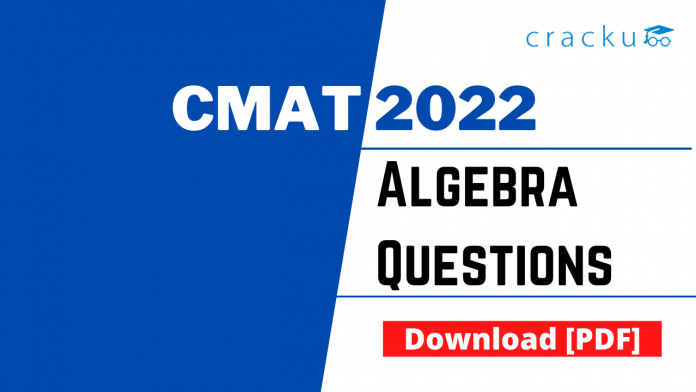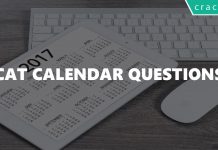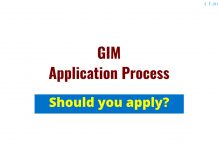Algebra Questions for CMAT 2022 – Download PDF
Download CMAT 2022 Algebra Questions pdf by Cracku. Very Important Algebra Questions for CMAT 2022 based on asked questions in previous exam papers. These questions will help your CMAT preparation. So kindly download the PDF for reference and do more practice.
Download Algebra Questions for CMAT
Get 5 CMAT mocks at just Rs.299
Download CMAT previous papers PDF
Question 1: If $\sqrt{x}=\sqrt{3}-\sqrt{5}$, then the value of $x^2-16x+6$ is:
a) 4
b) 0
c) 2
d) -2
Question 2: If $x=\frac{\sqrt{3}}{2}$, then the value of $\frac{\sqrt{1+x}+\sqrt{1-x}}{\sqrt{1+x}-\sqrt{1-x}}$ is equal to:
a) $\sqrt 2$
b) $\sqrt 3$
c) 3
d) 2
Question 3: If $a^3+b^3=62$ and a + b = 2, then the value of ab is:
a) -6
b) 9
c) 6
d) -9
Question 4: If $a-b=18$ and $a^3-b^3=324$, then find ab.
a) 105
b) -102
c) -104
d) 103
Question 5: If $a^2+\frac{2}{a^2}=16$, then find the value of $\frac{72a^2}{a^4+2+8a^2}$
a) 2
b) 4
c) 1
d) 3
Download CMAT Previous Papers PDF
Question 6: If a + 3b = 12 and ab = 9, then the value of (a – 3b) is:
a) 9
b) 8
c) 6
d) 4
Question 7: If $x^3 — 6x^2 + ax + b$ is divisible by $(x^2 — 3x + 2)$, then the values of a and b are:
a) a = -6 and b = -11
b) a = -11 and b = 6
c) a = 11 and b = -6
d) a = 6 and b = 11
Question 8: If a + b + c + d = 2, then the maximum value of (1 + a)(1 + b)(1 + c)(1 + d) is
a) $\frac{91}{9}$
b) $\frac{63}{22}$
c) $\frac{54}{13}$
d) $\frac{81}{16}$
Question 9: If $x + \frac{1}{x} = 4,$ then the value of $x^4 + \frac{1}{x^4} $ is :
a) 16
b) 196
c) 194
d) 14
Question 10: If x – y = 13 and xy = 25, then the value of $x^2 – y^2$ = ?
a) $13 \sqrt 240$
b) $13 \sqrt 229$
c) $13 \sqrt 269$
d) $13 \sqrt 210$
Question 11: 2x — 3y is a factor of:
a) $4x^2 + 2x – 3y + 9y^2 – 12xy$
b) $4x^2 + 9y^2 + 12xy$
c) $8x^3 + 27y^3$
d) $4x^2 + 2x – 3y + 36y^2 + 12xy$
Question 12: If a and b are two positive real numbers such that a + b = 20 and ab = 4, then the value of $a^3 + b^3$ is:
a) 7760
b) 8000
c) 8240
d) 240
Question 13: If x + y = 15 and xy = 14, then the value of x — y is:
a) 13
b) 12
c) 11
d) 14
Question 14: If a = 355, b = 356, c = 357,then find the value of $a^3 + b^3 + c^3 – 3abc$.
a) 3204
b) 3206
c) 3202
d) 3208
Question 15: If $x + y = 14; x^3 + y^3 = 1064$, then the value of $(x – y)^2$ is:
a) 36
b) 64
c) 81
d) 100
Question 16: If $a + b = 8$ and $a + a^2b + b + ab^2 = 128$ then the positive value of $a^3 + b^3$ is:
a) 344
b) 96
c) 224
d) 152
Question 17: The coefficient of y in the expansion of $(2y – 5)^3$, is:
a) 150
b) 50
c) -30
d) -150
Question 18: The given table represents the revenue (in ₹ crores) of a company from the sale of four products A, B, C and D in 6 years. Study the table carefully and answer the question that follows. By what percentage is the total revenue of the company from the sale of products A, B and D in 2012 and 2013 more than the total revenue from the sale of product B in 2013 to 2016?(Correct to one decimal place)
By what percentage is the total revenue of the company from the sale of products A, B and D in 2012 and 2013 more than the total revenue from the sale of product B in 2013 to 2016?(Correct to one decimal place)
a) 44.5
b) 31.2
c) 43.6
d) 45.4
Question 19: If $a + b + c = 19, ab + bc + ca = 120$, then what is the value of $a^3 + b^3 + c^3 – 3abc$?
a) 18
b) 23
c) 31
d) 19
Question 20: Solve the following:
(a + b + c)(ab + bc + ca) – abc = ?
a) (a + b)(b + c)(c – a)
b) (a + b)(b – c)(c + a)
c) (a + b)(b + c)(c + a)
d) (a – b)(b – c)(c – a)
Question 21: If $x^6 – 512 y^6 = (x^2 + Ay^2) (x^4 – Bx^2 y^2 + Cy^4)$, then what is the value of $(A + B – C)$?
a) -80
b) -72
c) 72
d) 48
Question 22: If $x, y, z$ are three integers such that $x + y = 8, y + z = 13$ and $z + x = 17$, then the value of $\frac{x^2}{yz}$ is:
a) $\frac{7}{5}$
b) $\frac{18}{11}$
c) 1
d) 0
Question 23: On simplification, $\frac{x^3 – y^3}{x[(x + y)^2 – 3xy]} \div \frac{y[(x – y)^2 + 3xy]}{x^3 + y^3} \times \frac{(x + y)^2 – (x – y)^2}{x^2 – y^2}$ is equal to:
a) 4
b) 1
c) $\frac{1}{2}$
d) $\frac{1}{4}$
Question 24: If $\left(x^3 + \frac{1}{x^3} – k\right)^2 + \left(x + \frac{1}{x} – p\right)^2 = 0$ where k and p are real numbers and x ≠ 0, then $\frac{k}{p}$ is equal to:
a) $P^2+1$
b) $P^2+3$
c) $P^2-1$
d) $P^2-3$
Question 25: For real a, b, c if $a^2 + b^2 + c^2 = ab + bc + ca$, the value of $\frac{(a+b)}{c}$
a) 3
b) 1
c) 2
d) 0
Enroll to CAT 2022 Complete Course
Answers & Solutions:
1) Answer (C)
Given, $\sqrt{x}=\sqrt{3}-\sqrt{5}$
$\Rightarrow$ $x=\left(\sqrt{3}-\sqrt{5}\right)^2$
$\Rightarrow$ $x=3+5-2\sqrt{15}$
$\Rightarrow$ $x=8-2\sqrt{15}$ ……………(1)
$\Rightarrow$ $x^2=\left(8-2\sqrt{15}\right)^2$
$\Rightarrow$ $x^2=64+60-32\sqrt{15}$
$\Rightarrow$ $x^2=124-32\sqrt{15}$ ………..(2)
$\therefore\ $ $x^2-16x+6=124-32\sqrt{15}-16\left(8-2\sqrt{15}\right)+6$
$=124-32\sqrt{15}-128+32\sqrt{15}+6$
$=130-128$
$=2$
Hence, the correct answer is Option C
2) Answer (B)
Given, $x=\frac{\sqrt{3}}{2}$
$\frac{\sqrt{1+x}+\sqrt{1-x}}{\sqrt{1+x}-\sqrt{1-x}}=\frac{\sqrt{1+x}+\sqrt{1-x}}{\sqrt{1+x}-\sqrt{1-x}}\times\frac{\sqrt{1+x}+\sqrt{1-x}}{\sqrt{1+x}+\sqrt{1-x}}$
$=\frac{1+x+1-x+2\left(\sqrt{1+x}\right)\left(\sqrt{1-x}\right)}{1+x-\left(1-x\right)}$
$=\frac{2+2\left(\sqrt{1-x^2}\right)}{2x}$
$=\frac{1+\sqrt{1-x^2}}{x}$
$=\frac{1+\sqrt{1-\left(\frac{\sqrt{3}}{2}\right)^2}}{\frac{\sqrt{3}}{2}}$
$=\frac{1+\sqrt{1-\frac{3}{4}}}{\frac{\sqrt{3}}{2}}$
$=\frac{1+\frac{1}{2}}{\frac{\sqrt{3}}{2}}$
$=\frac{3}{2}\times\frac{2}{\sqrt{3}}$
$=\sqrt{3}$
Hence, the correct answer is Option B
3) Answer (D)
Given, $a+b=2$
$a^3+b^3=62$
$\Rightarrow$ $\left(a+b\right)\left(a^2-ab+b^2\right)=62$
$\Rightarrow$ $\left(2\right)\left(a^2+2ab+b^2-3ab\right)=62$
$\Rightarrow$ $\left(a+b\right)^2-3ab=31$
$\Rightarrow$ $\left(2\right)^2-3ab=31$
$\Rightarrow$ $4-3ab=31$
$\Rightarrow$ $3ab=-27$
$\Rightarrow$ $ab=-9$
Hence, the correct answer is Option D
4) Answer (B)
Given, $a-b=18$ and
$a^3-b^3=324$
$\Rightarrow$ $\left(a-b\right)\left(a^2+ab+b^2\right)=324$
$\Rightarrow$ $\left(18\right)\left(a^2-2ab+b^2+3ab\right)=324$
$\Rightarrow$ $\left(a-b\right)^2+3ab=18$
$\Rightarrow$ $\left(18\right)^2+3ab=18$
$\Rightarrow$ $324+3ab=18$
$\Rightarrow$ $3ab=-306$
$\Rightarrow$ $ab=-102$
Hence, the correct answer is Option B
5) Answer (D)
Given, $a^2+\frac{2}{a^2}=16$
$\frac{72a^2}{a^4+2+8a^2}=\frac{72a^2}{a^2\left(a^2+\frac{2}{a^2}+8\right)}$
$=\frac{72}{a^2+\frac{2}{a^2}+8}$
$=\frac{72}{16+8}$
$=\frac{72}{24}$
$=3$
Hence, the correct answer is Option D
6) Answer (C)
Given, $a+3b=13$
$\Rightarrow$ $\left(a+3b\right)^2=12^2$
$\Rightarrow$ $a^2+9b^2+6ab=144$
$\Rightarrow$ $a^2+9b^2+6\left(9\right)=144$
$\Rightarrow$ $a^2+9b^2+54-6ab+6ab=144$
$\Rightarrow$ $a^2+9b^2-6ab+6ab=90$
$\Rightarrow$ $\left(a-3b\right)^2+6ab=90$
$\Rightarrow$ $\left(a-3b\right)^2+6\left(9\right)=90$
$\Rightarrow$ $\left(a-3b\right)^2+54=90$
$\Rightarrow$ $\left(a-3b\right)^2=36$
$\Rightarrow$ $a-3b=6$
Hence, the correct answer is Option C
7) Answer (C)
Given, $x^3—6x^2+ax+b$ is divisible by $(x^2 — 3x + 2)$
Let the quotient when $x^3 — 6x^2 + ax + b$ is divisible by $(x^2 — 3x + 2)$ be $x-p$
$\Rightarrow$ $(x^2—3x+2)\left(x-p\right)=x^3—6x^2+ax+b$
$\Rightarrow$ $x^3-3x^2+2x-px^2+3px-2p=x^3—6x^2+ax+b$
$\Rightarrow$ $x^3-\left(3+p\right)x^2+\left(2+3p\right)x-2p=x^3—6x^2+ax+b$
Comparing both sides,
$-\left(3+p\right)=-6$
$\Rightarrow$ $p=3$
$2+3p=a$
$\Rightarrow$ $2+3\left(3\right)=a$
$\Rightarrow$ $a=11$
$-2p=b$
$\Rightarrow$ $-2\left(3\right)=b$
$\Rightarrow$ $b=-6$
$\therefore\ $ a = 11 and b = -6
Hence, the correct answer is Option C
8) Answer (D)
Given, a + b + c + d = 2
We know that, AM $\ge\ $ GM
$\Rightarrow$ Arithmetic mean of (1 + a),(1 + b),(1 + c),(1 + d) $\ge\ $ Geometric mean of (1 + a),(1 + b),(1 + c),(1 + d)
$\Rightarrow$ $\frac{\left(1+a\right)+\left(1+b\right)+\left(1+c\right)+\left(1+d\right)}{4}\ge\left[\ \left(1+a\right)\left(1+b\right)\left(1+c\right)\left(1+d\right)\right]^{\frac{1}{4}}$
$\Rightarrow$ $\frac{4+a+b+c+d}{4}\ge\left[\left(1+a\right)\left(1+b\right)\left(1+c\right)\left(1+d\right)\right]^{\frac{1}{4}}$
$\Rightarrow$ $\frac{4+2}{4}\ge\left[\left(1+a\right)\left(1+b\right)\left(1+c\right)\left(1+d\right)\right]^{\frac{1}{4}}$
$\Rightarrow$ $\frac{6}{4}\ge\left[\ \left(1+a\right)\left(1+b\right)\left(1+c\right)\left(1+d\right)\right]^{\frac{1}{4}}$
$\Rightarrow$ $\left[\left(1+a\right)\left(1+b\right)\left(1+c\right)\left(1+d\right)\right]^{\frac{1}{4}}\le\ \frac{3}{2}$
$\Rightarrow$ $\left(1+a\right)\left(1+b\right)\left(1+c\right)\left(1+d\right)\le\ \left(\frac{3}{2}\right)^4$
$\Rightarrow$ $\left(1+a\right)\left(1+b\right)\left(1+c\right)\left(1+d\right)\le\ \frac{81}{16}$
$\therefore\ $Maximum value of (1 + a)(1 + b)(1 + c)(1 + d) = $\frac{81}{16}$
Hence, the correct answer is Option D
9) Answer (C)
Given, $x + \frac{1}{x} = 4$
$=$> $\left(x+\frac{1}{x}\right)^2=4^2$
$=$> $x^2+\frac{1}{x^2}+2.x.\frac{\ 1}{x}=16$
$=$> $x^2+\frac{1}{x^2}+2=16$
$=$> $x^2+\frac{1}{x^2}=14$
$=$> $\left(x^2+\frac{1}{x^2}\right)^2=14^2$
$=$> $x^4+\frac{1}{x^4}+2.x^2.\frac{\ 1}{x^2}=196$
$=$> $x^4+\frac{1}{x^4}+2=196$
$=$> $x^4+\frac{1}{x^4}=196-2$
$=$> $x^4+\left(\frac{1}{x}\right)^4=194$
Hence, the correct answer is Option C
10) Answer (C)
Given,
$x – y = 13$ and $xy = 25$
$=$> $\left(x-y\right)^2=13^2$
$=$> $x^2+y^2-2xy=169$
$=$> $x^2+y^2+2xy-4xy=169$
$=$> $\left(x+y\right)^2-4xy=169$
$=$> $\left(x+y\right)^2-4\left(25\right)=169$
$=$> $\left(x+y\right)^2-100=169$
$=$> $\left(x+y\right)^2=269$
$=$> $x+y=\sqrt{269}$
$\therefore\ $ $x^2-y^2=\left(x+y\right)\left(x-y\right)=\left(\sqrt{269}\right)\left(13\right)=13\sqrt{269}$
Hence, the correct answer is Option C
11) Answer (A)
$4x^2 + 2x – 3y + 9y^2 – 12xy=4x^2+9y^2-12xy+2x-3y$
$=\left(2x-3y\right)^2+2x-3y$
$=\left(2x-3y\right)\left(2x-3y+1\right)$
$\therefore\ $ $2x+3y$ is factor of $4x^2 + 2x – 3y + 9y^2 – 12xy$
Hence, the correct answer is Option A
12) Answer (A)
Given, $a+b=20$ and $ab=4$
$=$> $\left(a+b\right)^3=20^3$
$=$> $a^3+b^3+3ab\left(a+b\right)=8000$
$=$> $a^3+b^3+3\left(4\right)\left(20\right)=8000$
$=$> $a^3+b^3+240=8000$
$=$> $a^3+b^3=8000-240$
$=$> $a^3+b^3=7760$
Hence, the correct answer is Option A
13) Answer (A)
Given, $x+y\ =15$ and $xy=14$
$=$> $\left(x+y\right)^2=15^2$
$=$> $x^2+y^2+2xy=225$
$=$> $x^2+y^2+2xy-2xy+2xy=225$
$=$> $x^2+y^2-2xy+4xy=225$
$=$> $\left(x-y\right)^2+4\left(14\right)=225$
$=$> $\left(x-y\right)^2+=225-56$
$=$> $\left(x-y\right)^2+=169$
$=$> $x-y=13$
Hence, the correct answer is Option A
14) Answer (A)
Given, $a$ = 355, $b$ = 356, $c$ = 357
$a^3+b^3+c^3—3abc=\left(a+b+c\right)\left(a^2+b^2+c^2-ab-bc-ca\right)$
$=\frac{1}{2}\left(a+b+c\right)\left(2a^2+2b^2+2c^2-2ab-2bc-2ca\right)$
$=\frac{\left(a+b+c\right)}{2}\left[\left(a-b\right)^2+\left(b-c\right)^2+\left(c-a\right)^2\right]$
$=\frac{\left(355+356+357\right)}{2}\left[\left(355-356\right)^2+\left(356-357\right)^2+\left(357-355\right)^2\right]$
$=\frac{1068}{2}\left[1+1+4\right]$
$=\frac{1068}{2}\left[6\right]$
$=3204$
Hence, the correct answer is Option A
15) Answer (A)
Given, $x + y = 14$
$x^3 + y^3 = 1064$
$=$> $\left(x+y\right)\left(x^2+y^2-xy\right)=1064$
$=$> $14\left(x^2+y^2+2xy-3xy\right)=1064$
$=$> $\left(x+y\right)^2-3xy=76$
$=$> $\left(14\right)^2-3xy=76$
$=$> $196-3xy=76$
$=$> $3xy=120$
$=$> $xy=40$
$\therefore\ $ $(x – y)^2=x^2+y^2-2xy$
$=x^2+y^2+2xy-4xy$
$=\left(x+y\right)^2-4xy$
$=\left(14\right)^2-4\left(40\right)$
$=196-160$
$=36$
Hence, the correct answer is Option A
16) Answer (D)
Given, $a + b = 8$
$a + a^2b + b + ab^2 = 128$
$=$> $a\left(1+ab\right)+b\left(1+ab\right)=128$
$=$> $\left(1+ab\right)\left(a+b\right)=128$
$=$> $\left(1+ab\right)8=128$
$=$> $ 1+ab =\frac{128}{8}$
$=$> $1+ab=16$
$=$> $ab=15$
$\therefore\ $ $a^3+b^3=\left(a+b\right)\left(a^2+b^2-ab\right)$
$= 8 (a^2+b^2+2ab-3ab)$
$=8 \left(\left(a+b\right)^2-3ab\right)$
$=8 \left(8^2-3\left(15\right)\right)$
$=8 \left(64-45\right)$
$=152$
Hence, the correct answer is Option D
17) Answer (A)
$(2y – 5)^3$
= $8y^3 – 125 +150y – 60y^2$
$(\because(a-b)^3 = a^3 – b^3 – 3a^2b + 3ab^2)$
The coefficient of y = 150
18) Answer (D)
Total revenue of the company from the sale of products A, B and D in 2012 and 2013 = 98 + 74 + 74 + 94 + 96 + 102 = 538
Total revenue from the sale of product B in 2013 to 2016 = 96 + 92 + 84 + 98 = 370
Required percentage = $\frac{538 – 370}{370} \times 100$ = 45.4%
19) Answer (D)
$(a + b + c)^2 = a^2 +b^2 + c^2 + 2ab + 2bc + 2ca$
$ 19^2 = a^2 +b^2 + c^2 + 2(120)$
$a^2 +b^2 + c^2 = 361 – 240 = 121$
$a^3 + b^3 + c^3 – 3abc$
=$ (a + b + c)(a^2 + b^2 + c^2 -ab -bc – ca)$
= 19(121$ \times -120) = 19$
20) Answer (C)
(a + b + c)(ab + bc + ca) – abc
= $a^2b + a^2c + ab^2 + cb^2 + bc^2 + ac^2 + 2abc$
= $a^2(b +c)+bc(b+c)+a(b^2+c^2+2bc)$
= $a^2(b+c)+bc(b+c)+a(b+c)^2$
=$(b+c)(a^2+bc+ab+ac)$
= (b + c)[a(a + b) + c(a + b)]
= (a + b)(b + c)(c + a)
21) Answer (A)
$x^6 – 512 y^6 = (x^2 + Ay^2) (x^4 – Bx^2 y^2 + Cy^4)$
$(x^2)^3 + (-8y^2)^3 = (x^2 + Ay^2) (x^4 – Bx^2 y^2 + Cy^4)$
$(\because a^3 + b^3 = (a + b)(a^2 – ab + b^2))$
by comparison –
$-8y^2 = Ay^2$
A = -8
$Bx^2y^2 = x^2 \times -8y^2$
B = -8
$(-8y^2)^2 = Cy^4$
C = 64
The value of $(A + B – C)$ = -8 – 8 – 64 = -80
22) Answer (B)
x + y = 8 —-(1)
y + z = 13 —-(2)
z + x = 17 —-(3)
Eq (1) + (2) + (3),
2(x + y + z) = 8 + 13 + 17
x + y + z = 38/2 = 19 —-(4)
From eq (3) and (4),
x + 13 = 19
x = 6
From eq(3),
z + x = 17
z + 6 = 17
z = 11
From eq(2),
y + z = 13
y + 11 = 13
y = 2
$\frac{x^2}{yz}$
= $\frac{6^2}{2 \times 11}$
= 36/22 = 18/11
23) Answer (A)
$\frac{x^3 – y^3}{x[(x + y)^2 – 3xy]} \div \frac{y[(x – y)^2 + 3xy]}{x^3 + y^3} \times \frac{(x + y)^2 – (x – y)^2}{x^2 – y^2}$
= $\frac{x^3 – y^3}{x[(x + y)^2 – 3xy]} \times \frac{x^3 + y^3}{y[(x – y)^2 + 3xy]} \times \frac{(x + y)^2 – (x – y)^2}{x^2 – y^2}$
= $\frac{(x – y)(x^2 + xy + y^2)}{x[(x + y)^2 – 3xy]} \times \frac{(x + y)(x^2 – xy + y^2)}{y[(x – y)^2 + 3xy]} \times \frac{(x^2 + y^2 + 2xy) – (x^2 + y^2 – 2xy)}{(x + y)(x – y)}$
= $\frac{x^2 + xy + y^2}{x[x^2 – xy + y^2]} \times \frac{x^2 – xy + y^2}{y[x^2 + xy + y^2]} \times 4xy$ = 4
24) Answer (D)
$\left(x^3 + \frac{1}{x^3} – k\right)^2 + \left(x + \frac{1}{x} – p\right)^2 = 0$
It will be zero, if the individual terms will be zero.
So, $(x^3 + \frac{1}{x^3} – k)^2=0$ and $(x + \frac{1}{x} – p)^2$
So, $k=x^3 + \frac{1}{x^3}$ and $(x + \frac{1}{x} – p)^2=0$
$k=x^3 + \frac{1}{x^3}$ and $(x + \frac{1}{x} )=p$
Now, $(x + \frac{1}{x} )=p$ taking cube of both side,
$\Rightarrow (x + \frac{1}{x} )^3=p^3$
$\Rightarrow x^3+\dfrac{1}{x^3}+3(x+\dfrac{1}{x})=p^3$
Now substituting the values in the above,
$\Rightarrow k+3p=p^3$
$\Rightarrow k=p^3-3p$
$\Rightarrow \dfrac{k}{p}=p^2-3$
25) Answer (C)
Given, $a^2+b^2+c^2=ab+bc+ca$
Multiplying both sides by “2”, it becomes
$2\left(a^2+b^2+c^2\right)=2\left(ab+bc+ca\right)$
$2a^2+2b^2+2c^2=2ab+2bc+2ca$
$a^2+a^2+b^2+b^2+c^2+c^2-2ab-2bc-2ca=0$
$\left(a^2+b^2-2ab\right)+\left(b^2+c^2-2ca\right)+\left(c^2+a^2-2ca\right)=0$
$\left(a-b\right)^2+\left(b-c\right)^2+\left(c-a\right)^2=0$
Sum of squares is zero so each term should be zero
$=$> $\left(a-b\right)^2=0$, $\left(b-c\right)^2=0$, $\left(c-a\right)^2=0$
$=$> $a-b=0$, $b-c=0$, $c-a=0,$
$=$> $a=b$, $b=c$, $c=a$
$=$> $a=b=c$
Therefore $\ \frac{\ a+b}{c}=\ \frac{\ a+a}{a}=\ \frac{\ 2a}{a}=2$





